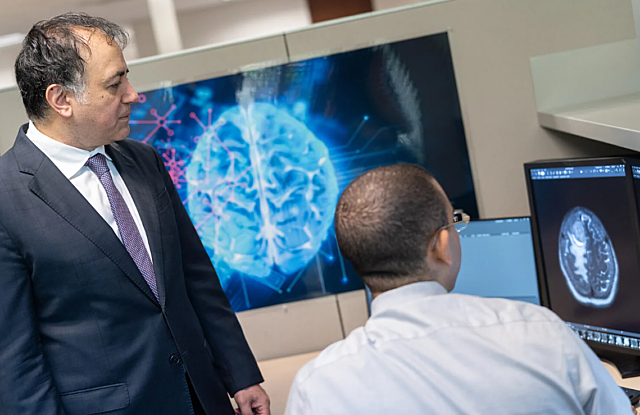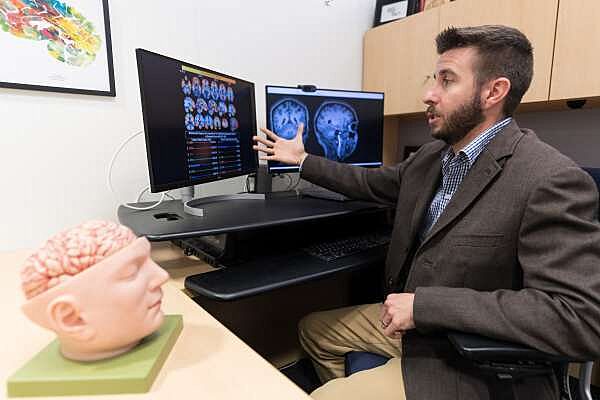AI Appreciation Day: How UF Health is Using AI to Improve Patient Care

The impact of artificial intelligence can be felt in many fields, but nothing can compare to the effect it’s had on health care.
AI has revolutionized medical imaging, drug discovery, disease diagnosis and treatment optimization. All of this makes AI a valuable partner as we push for more efficient health care delivery.
With July 16 being AI Appreciation Day, which celebrates the positive achievements of AI technology to humanity, UF Health and the University of Florida are proud to share some of the ways we’re using AI to improve the quality of care we can provide our patients.
Predicting Alzheimer’s disease
Leveraging electronic health records, University of Florida researchers have devised an artificial intelligence system capable of predicting the onset of Alzheimer's disease up to five years prior to diagnosis, addressing the current absence of early screening tests for the condition and the subsequent significant brain damage caused by delayed detection.
Real-world clinical data, such as electronic health records, can be effective screening tools for conditions like Alzheimer’s disease, said Jiang Bian, PhD, chief data scientist for UF Health and a professor of biomedical informatics in the College of Medicine. Obesity, hypertension, high cholesterol and other known risk factors for Alzheimer’s disease are regularly recorded in patients’ electronic health records.
Predicting who may develop certain rare diseases
A collaborative effort between UF Health and Penn Medicine involves the utilization of a set of artificial intelligence-driven algorithms called PANDA, aimed at identifying rare "zebra" cases within patient medical records, expediting diagnosis and treatment for individuals affected by these uncommon diseases.
The elusive and puzzling nature of symptoms coupled with their low prevalence often result in challenges when diagnosing them. This may lead to years of undiagnosed and untreated cases. That’s what prompted Jiang Bian, PhD, and a team of researchers from UF Health and the Perelman School of Medicine at the University of Pennsylvania to develop an alert system utilizing electronic health records to notify physicians when their patients exhibit indications of specific rare diseases.
Taking radiology to the next level
In an academic-industry collaboration, UF Health researchers are leveraging AI tools to enhance the precision and efficiency of radiologists' work, aiming to develop and refine AI-based solutions that optimize quality, safety and the speed of radiologists' operations.
The ultimate goal is seamless integration of AI into clinical practice, providing cost-effective processes to improve patient care. Through a partnership with Nuance Communications Inc., a specialized firm in radiology voice recognition and AI deployment, they will optimize radiology workflow and deploy AI tools using Nuance's Precision Imaging Network, potentially leading to the advancement of improved radiologic voice recognition tools.
Paving the way to improve critical care
As part of the National Institutes of Health's Bridge to Artificial Intelligence (Bridge2AI) program, UF has received $3.6 million from a $23.5 million multicenter grant to undertake an unprecedented four-year data-generation project aimed at establishing an infrastructure for artificial intelligence in critical care. The objective is to enhance patients' recovery from life-threatening illnesses.
The project involves creating a network of university health systems that will collectively contribute anonymized data from over 100,000 critically ill patients for AI research purposes. The project will also encompass AI workforce training events, the development of ethical standards for AI use in critical care, publicly accessible AI tutorials and guidelines for fostering collaborative medical AI research approaches.
Improving patient safety and quality of care
In the context of routine knee surgeries, where multiple health care providers are involved, including anesthesiologists, physician assistants and surgeons, the UF College of Medicine is using AI to model the intricate network of interactions among these caregivers. In doing so, a comprehensive patient safety graph will be constructed that captures the vast array of collaborations, thereby revolutionizing our approach to hospital operations and spearheading innovative methods of delivering high-quality care.
The patient safety graph represents just one facet of the UF College of Medicine's implementation of AI in enhancing patient safety through the AI-QI initiative, a series of programs aimed at leveraging AI research to drive tangible improvements in patient care within the realm of quality improvement activities at UF Health.
Staving off dementia
A study conducted at the UF College of Public Health and Health Professions aims to provide insights into identifying older adults who are at risk for Alzheimer's disease and are likely to benefit from cognitive training programs that target cognitive decline associated with aging and the disease.
The study will employ a combination of brain imaging and artificial intelligence techniques to evaluate the efficacy of a 12-week, take-home cognitive training program. The project is supported by a five-year K23 research career development grant from the National Institute on Aging, with funding exceeding $800,000. It is led by Joseph Gullett, PhD, an assistant professor in the department of clinical and health psychology within the PHHP, who was recruited as part of UF's AI initiative.
Mapping the human body’s cells
UF Health researchers, led by faculty member Pinaki Sarder, PhD, are spearheading the development of an AI algorithm intended for nationwide use by scientists engaged in mapping the complete human body at the single-cell level. Sarder serves as an associate professor of quantitative health in the UF Department of Medicine and associate director of imaging for UF's Intelligent Critical Care Center, or IC3.
Having secured funding from the National Institutes of Health, UF is partaking in the Human Biomolecular Atlas Program consortium, collaborating with various universities and institutions to contribute data to the HuBMAP Data Portal, aiming to construct an openly accessible map of the human body's cellular organization and function to enhance our understanding of human health.
Better insight into patient conditions
UF researchers have developed an AI system that uses patient vital signs data to expedite and enhance doctors' decision-making during the critical initial stages of hospitalization. The system leverages an algorithm that processes data from six vital signs measured within six hours of admission and classifies them into one of four distinct clusters. This provides physicians with clearer, more timely and accurate insights into a patient's prognosis and potential medical outcomes. With this help, physicians may gain the ability to identify high-risk patients within hours, as reported in the journal PLOS Digital Health.
This AI-driven approach allows for faster and more comprehensive analysis of patient data compared to physicians, as highlighted by Azra Bihorac, MD, senior associate dean for research affairs at the UF College of Medicine and director of UF's Intelligent Critical Care Center.
About the author


